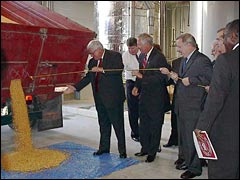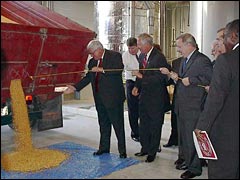I am very excited to see this Grist series, because I am a biodiesel user. I am also very worried about the growth of the biofuels industry, because I am an environmental-justice advocate, and I see this industry rapidly leaving my community behind.

What happens after the photo shoot?
Photo: house.gov
The growth of the biofuels industry creates significant economic benefits and downsides, economic winners and losers. Today, my words are a request that we ask hard questions about those winners and losers, about who is poised to benefit from this nascent industry.
Let’s start with some recent history.
Did you ever see that PBS series, Revenge of the Nerds, about the genesis and rise of the computer industry? Passionate, brilliant visionaries plus strategic, timely public and private investments plus emerging marketplace added up to gobs of new companies, new jobs, and wealth creation.
But there was a part of the story called Xerox’s X-Park, where the company gathered a bunch of the best and the brightest computer folk, gave them access to whatever technology or equipment they wanted and all the soda they could drink, and said, “Have at it!” There, they developed email, graphical user interface, and other innovations fundamental to the industry’s eventual success.
Here’s what I wonder: What if the Xerox folks had said, “Oh and hey, best and brightest? We can’t have a digital divide or anything like that. We don’t want poor folks and people of color left out of this industry, so figure out how to share the wealth, OK? There should be plenty for everyone, anyway.”
Well, and of course they did not do that.
Imagine if they had. Imagine how different things would be, how many lives would have been impacted if these communities were included among the direct economic beneficiaries of this now colossal industry.
But of course, they did not. And, biofuels brothers and sisters — and broader relations in the rest of the sustainability world — we are not doing it now. The same choice is right in front of us, and we are taking the same exclusive road.
We have passionate and brilliant biofuels visionaries; we have strategic, timely public and private biofuels investments; we have an emerging biofuels marketplace. Undoubtedly, we will create more new companies, new jobs, and new wealth. But know this: Unless we do something purposeful, these economic benefits will allocate the same way as those of the computer industry, and the same way we distribute the economic benefits of other environmental industries.
Maybe you just have not thought about this. Maybe you have been working so hard (week after week, year after year) to make biofuels happen, to realize these economic and environmental benefits, that you just have not thought about equity — about just who will work in those factories or start a business that benefits from a cluster relationship with biofuel production or distribution. Maybe nobody brought it to your attention.
Well, consider this article your notice. Here’s your chance to do the right thing, to put the equity leg on the sustainability stool, the chance to put your knowledge at the service of those trying to create job and business opportunities for low-income and people-of-color communities.
You see, you know this industry, and we don’t.
We do know how to work with employers and governments to ensure that these communities get a piece of a publicly funded or publicly subsidized economic pie. We have been working on that for decades, on new highways, construction projects, and light-rail lines. There are models.
We also know how to work with these communities, how to help individual community members and businesses get ready for those economic opportunities that have made a commitment to a diverse workforce or minority contracting.
But we do not know the biofuels industry. We don’t know what kind of jobs and business opportunities will be created, what skills and/or technical assistance they will require. And not just jobs and businesses at the farm or factory levels, but the vendors, suppliers, consultants, and so on who will connect with a given biofuel’s production and distribution.
You know this stuff, so you can help.
All of us know the truth: the sustainability movement produces environmental results and economic results, but not much equity. In funder reports, sustainability groups can detail firm environmental and economic deliverables (e.g., policies enacted, businesses supported, research completed and shared), but fill their equity sections with soft words like “partner,” “explore,” and “outreach.”
Maybe you have found yourself sitting around a table with your elected officials, accompanied by few, if any, participants from low-income or people-of-color communities, and frustrated by the lack of consistent political support for sustainability. At the same time, and throughout the country, many low-income or people-of-color communities struggle to secure steady jobs with good wages and benefits. They are economically marginalized, left out of sustainability’s growing economic benefits.
You know this stuff, so you can help.

